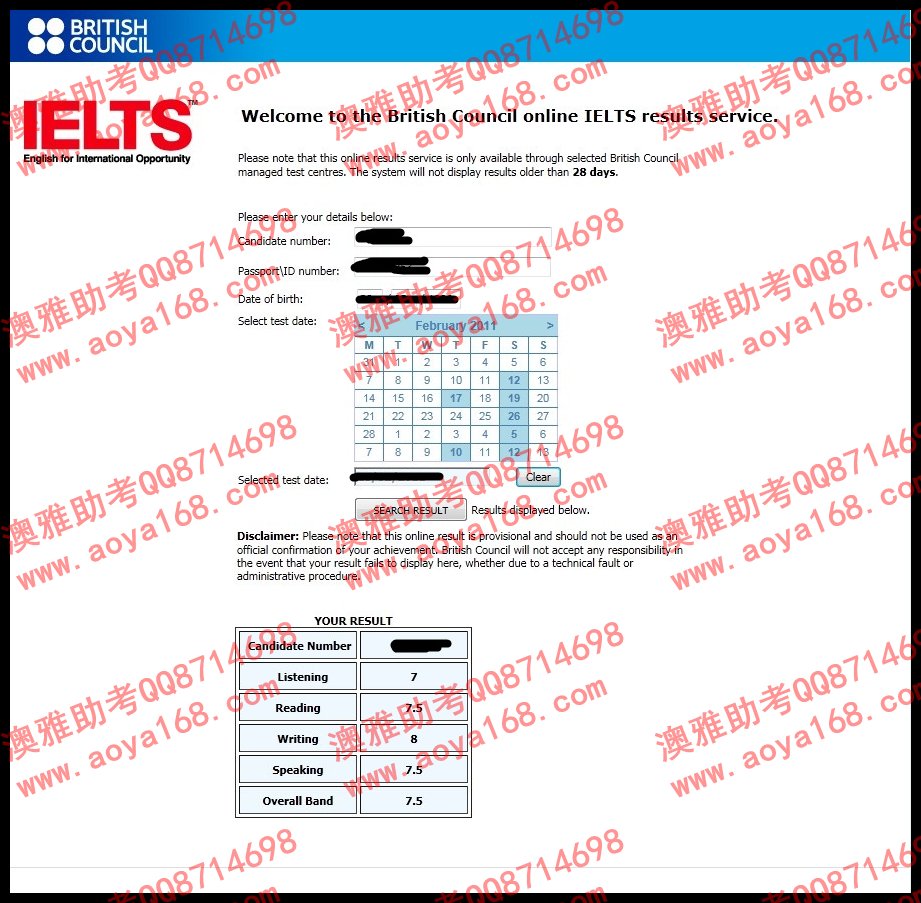澳雅助考,成功选择!
为商者,诚信根基,方可久存!
专业操作雅思,托福,GRE等出国类考试,零风险,成绩合格后付款!微信:aoya168
一个帅小伙的雅思8分写作,我也是醉了,佩服这样的小伙,有这样的写作功底,真的是不了得啊澳雅雅思代考 澳洲雅思替考
发布:aoya168 | 分类:雅思考试 | 引用:0 | 浏览:
20 Jan 2015Nowadays, the education system faces the challenges of training globalized and well-rounded young candidates for the society. Although more and more academic disciplines and subjects are being introduced in schools and universities, students still face the reality of a competitive job market. Among the listed subjects, I think that literature is the least important and foreign languages are the most important.
Literature classes can train students to appreciate literature and improve their writing skills. However, a strictly academic approach adopted by many schools at the moment focuses too much on theory and is too far removed from the professional world. For example, a common assignment in literature classes is an essay on important, often historic literary works. Students are expected to use literary theories theory to analyze the work and provide their insight. Nonetheless, such trainings are one-sided, improving the students’ intellectual and literary abilities butignoring more specific, applicable skills such as doing business presentations or drafting business reports. Literature is are too general of a discipline to prepare the students for future jobs.
On the flip side, as the job market is becoming more globalized, foreign languages are a common pre-requisites for job positions. Foreign language classes not only equip the students with linguistic skills, but also offer cultural lessons and tips for those who seek jobs in overseas markets. For instance, the US job market is currently facing recession and a lot of college graduates are moving to countries in Asia for jobs. Picking up foreign languages early on in high school or university helps students to look for opportunities abroad and become global citizens who are compatible with both domestic and foreign job markets.
In conclusion, young students should be exposed to a variety of academic subjects in school, but should also be professionally ready for future careers. Literature classes are intellectually beneficial, but are too academic and far removed from the professional world. On the other side, foreign languages are crucial in broadening the students’ professional and cultural scope. By the time they graduate, they will be more competitive and more adept in whatever their field of choiceis.
Wow! Reading through this is a breath of fresh air!
This is a good piece. Too bad I cannot rate if properly because there is not task prompt. So I won’t know if you actually did answer what the prompt is asking. Nevertheless, this is well written.
<--OVERALL BAND
TASK RESPONSE/TASK ACHIEVEMENT
CANNOT BE ASSESSED
8 COHERENCE & COHESION
• Transition is suave
• Ideas progress logically
8 LEXICAL RESOURCE
• Vocabulary is laid down fluently
• There is just a slip in spelling
8 GRAMMATICAL RANGE AND ACCURACY
• There is a mix of structures
• There is frequent error-free sentences
REVISED VERSION
The changes you find here are only grammatical and mechanical. Any change in content is for you to incorporate. Ideas set in bold (if any) are the ones that need to be improved, developed, or changed.
Nowadays, the education system faces the challenges of training globalized and well-rounded young candidates for the society. Although more and more academic disciplines and subjects are being introduced in schools and universities, students still face the reality of a competitive job market. Among the listed subjects, I think that literature is the least important and foreign languages are the most important.
Literature classes can train students to appreciate literature and improve their writing skills. However, a strictly academic approach adopted by many schools at the moment focuses too much on theory and is too far removed from the professional world. For example, a common assignment in literature classes is an essay on important, often historic literary works. Students are expected to use literary theories to analyze the work and provide their insight. Nonetheless, such trainings are one-sided, improving the students’ intellectual and literary abilities but ignoring more specific, applicable skills such as doing business presentations or drafting business reports. Literature is too general of a discipline to prepare the students for future jobs.
On the flip side, as the job market is becoming more globalized, foreign languages are a common pre-requisites for job positions. Foreign language classes not only equip the students with linguistic skills, but also offer cultural lessons and tips for those who seek jobs in overseas markets. For instance, the US job market is currently facing recession and a lot of college graduates are moving to countries in Asia for jobs. Picking up foreign languages early on in high school or university helps students to look for opportunities abroad and become global citizens who are compatible with both domestic and foreign job markets.
In conclusion, young students should be exposed to a variety of academic subjects in school, but should also be professionally ready for future careers. Literature classes are intellectually beneficial, but are too academic and far removed from the professional world. On the other side, foreign languages are crucial in broadening the students’ professional and cultural scope. By the time they graduate, they will be more competitive and more adept in whatever their field of choice is.
Good luck!
Tip for the day
Tips for how best to use your time in the IELTS Writing Test.
It’s a sad fact that there are many candidates who have a good enough level of English to get the IELTS Writing Band Score they need but who fail to complete the writing test.
The issue here is really about time management. In the Writing Test, you have exactly 60 minutes to complete two tasks; Task 1 (150 words) and Task 2 (250 words). I STRONGLY advise you to spend about 20 minutes on Task 1 and 40 minutes on Task 2.in order to give yourself time to complete the test.
So, when you do practice IELTS tests at home, your aim is to get to a point of doing Task in 20 minutes and Task 2 in 40 minutes. Don’t worry about it at first; remember this is your aim for test day. I suggest that you take all the time you need for the first couple of practice tests and then gradually speed up. You need to strike a balance between grammatical accuracy, using great expressions and vocabulary and doing it all within a time frame.
You’ve also got to strike a balance between respecting that time is an important factor and becoming over-anxious about it. It is one thing to occasionally look at the clock to see how you’re going for time but it’s another to constantly clock-watch. Constant clock-watching eats away at your time. If you practise timed writing tasks at home, you’ll soon learn to feel what 20/40 minutes feels like.
Another thing that eats away at your time is counting words too frequently. Again, there are things you can do at home to help reduce this.
• Do a practice IELTS Writing Test.
• Count the number of words in 5 lines of your writing. Divide this number by 5 and that will give you the average number of words you write on a line (assuming that your handwriting is always of a similar size!).
An IELTS Answer page is just an average A4-sized piece of paper. A full page has about 20 lines; so if your average number of words per line is usually 10, you would write about 200 words on a full page.
These two simple tips can help you avoid wasting valuable time on test day.
Here’s to the best IELTS score possible!
From
- 相关文章:
这个是一个181,体重130的小伙子写的雅思写作7分,以前我的同事,他女友超级漂亮,很羡慕啊 (2015-1-14 7:50:46)
一个帅小伙的7分写作,但是老师给了6分,确实很苛刻啊,但是严师出高徒啊!加油,雅思替考 澳洲雅思代考 (2015-1-6 8:27:28)
另外一个长腿妹妹写的雅思写作7分,而且皮肤很白,和我在一起的话,就是才子佳人,哈哈本站原创,澳洲雅思代考,雅思枪手 (2014-12-29 7:4:35)
一个雅思高手,现在在医院上班,雅思写作7分,绝对才女,本站原创,澳雅雅思代考,澳洲雅思枪手 (2014-12-22 21:19:57)
一个身高180,长相像言承旭的一个大帅哥写的雅思7分作文,才貌双全啊!本站唯一原创,真正的实力澳洲雅思移民雅思替考 (2014-12-5 22:7:33)
雅思写作7分,批改的老师给了6.5,好苛刻啊,本站原创 (2014-11-19 8:29:30)
一个大美女的雅思7分写作,真的是德智体美劳全面发展!绝对本站原创 (2014-11-12 21:27:36)
招聘雅思老师 (2014-11-4 7:55:50)
高薪招聘雅思培训老师 (2014-11-4 7:55:12)
高薪招聘雅思枪手 (2014-11-4 7:53:5)
发表评论
◎欢迎参与讨论,请在这里发表您的看法、交流您的观点。




0评论 - 一个帅小伙的雅思8分写作,我也是醉了,佩服这样的小伙,有这样的写作功底,真的是不了得啊澳雅雅思代考 澳洲雅思替考